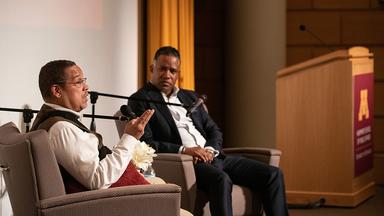While educators generally agree that early childhood education programs can help prepare young children for kindergarten, not all of those programs are created equal.
Data show that only half of all children are ready for school when they enter kindergarten, and that children who may have gained skills in preK programs often lose those gains as they get older.
A new book co-edited by two leading scholars at the University of Minnesota examines the practices that are most effective at sustaining the gains in children’s learning well into elementary school.
Sustaining Early Childhood Learning Gains: Program, School, and Family Influences, was edited by Humphrey School Professor Judy Temple and Professor Arthur Reynolds of the Institute of Child Development.
With contributions from leading researchers across many disciplines, the book highlights interventions and practices that promote healthy development in the first decade of life, and recommends ways schools, families, communities, and public institutions can lend support.
“We know that high-quality pre-K and early education improve school readiness skills and later success,” notes Reynolds, “but ensuring that all programs are effective and families have access to them require strong support systems.”
What makes an early education program successful? Temple says the two most important factors are: small class sizes of 17 or fewer children, and more time spent in the program.
“Children who participate in full-day rather than half-day preschool programs, and who attend for two years rather than one year, clearly see positive effects, especially if they are in a high-quality program,” says Temple.
Other important factors include well-qualified teachers, a focus on readiness skills, parental involvement, family support, and easier transitions from preschool to kindergarten.
But those are expensive options that some parents might not be able to afford. The book also emphasizes the importance of local, state, and national support for early childhood education.
Podcast: Learn more about Temple's research


